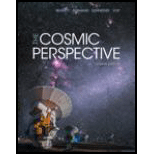
The Cosmic Perspective (8th Edition)
8th Edition
ISBN: 9780134059068
Author: Jeffrey O. Bennett, Megan O. Donahue, Nicholas Schneider, Mark Voit
Publisher: PEARSON
expand_more
expand_more
format_list_bulleted
Textbook Question
Chapter 2, Problem 13EAP
Why do we always see the same face of the Moon?
Expert Solution & Answer
Want to see the full answer?
Check out a sample textbook solution
Students have asked these similar questions
Please solve and answer this problem correctly please. Thank you!!
Please solve and answer this problem correctly please. Thank you!!
a) Use the node-voltage method to find v1, v2, and
v3 in the circuit in Fig. P4.14.
b) How much power does the 40 V voltage source
deliver to the circuit?
Figure P4.14
302
202
w
w
+
+
+
40 V
V1
80 Ω 02
ΣΑΩ
28 A
V3 +
w
w
102
202
Chapter 2 Solutions
The Cosmic Perspective (8th Edition)
Ch. 2 - Prob. 1VSCCh. 2 - Use the following questions to check your...Ch. 2 - Use the following questions to check your...Ch. 2 - Use the following questions to check your...Ch. 2 - Use the following questions to check your...Ch. 2 - Use the following questions to check your...Ch. 2 - Use the following questions to check your...Ch. 2 - Use the following questions to check your...Ch. 2 - Prob. 1EAPCh. 2 - Suppose you were making a model of the celestial...
Ch. 2 - On a clear, dark night, the sky may appear to be...Ch. 2 - Why does the local sky look like a dome? Define...Ch. 2 - Prob. 5EAPCh. 2 - What are circumpolar stars? Are more stars...Ch. 2 - What are latitude and longitude? Does the sky vary...Ch. 2 - What is the zodiac, and why do we see different...Ch. 2 - Suppose Earth’s axis had no tilt. Would we still...Ch. 2 - Briefly describe key facts about the solstices and...Ch. 2 - What is precession? How does it affect what we see...Ch. 2 - Briefly describe the Moon’s cycle of phases. Can...Ch. 2 - Why do we always see the same face of the Moon?Ch. 2 - Why don’t we see an eclipse at every new and full...Ch. 2 - What do we mean by the apparent retrograde motion...Ch. 2 - Prob. 16EAPCh. 2 - Prob. 17EAPCh. 2 - Prob. 18EAPCh. 2 - Prob. 19EAPCh. 2 - Prob. 20EAPCh. 2 - Does It Make Sense? Decide whether the statement...Ch. 2 - Does It Make Sense? Decide whether the statement...Ch. 2 - Prob. 23EAPCh. 2 - Does It Make Sense? Decide whether the statement...Ch. 2 - Does It Make Sense? Decide whether the statement...Ch. 2 - Does It Make Sense? Decide whether the statement...Ch. 2 - Quick Quiz Choose the best answer to each of the...Ch. 2 - Quick Quiz Choose the best answer to each of the...Ch. 2 - Quick Quiz Choose the best answer to each of the...Ch. 2 - Prob. 30EAPCh. 2 - Quick Quiz Choose the best answer to each of the...Ch. 2 - Quick Quiz Choose the best answer to each of the...Ch. 2 - Quick Quiz Choose the best answer to each of the...Ch. 2 - Quick Quiz Choose the best answer to each of the...Ch. 2 - Quick Quiz Choose the best answer to each of the...Ch. 2 - Quick Quiz Choose the best answer to each of the...Ch. 2 - Earth-Centered or Sun-Centered? Decide whether...Ch. 2 - Shadow Phases. Many people incorrectly guess that...Ch. 2 - Lunar Phases and Time of Day. Roles: Scribe (takes...Ch. 2 - New Planet. A planet in another solar system has a...Ch. 2 - Your View of the Sky. a. What are your latitude...Ch. 2 - View from the Moon. Assume you live on the Moon,...Ch. 2 - View from the Sun. Suppose you lived on the Sun...Ch. 2 - A Farther Moon. Suppose the distance to the Moon...Ch. 2 - A Smaller Earth. Suppose Earth were smaller. Would...Ch. 2 - Observing Planetary Motion. Find out which planets...Ch. 2 - 47. A Connecticut Yankee. Find the book A...Ch. 2 - Be sure to show all calculations clearly and state...Ch. 2 - Be sure to show all calculations clearly and state...Ch. 2 - Be sure to show all calculations clearly and state...Ch. 2 - Be sure to show all calculations clearly and state...Ch. 2 - Prob. 52EAPCh. 2 - Prob. 53EAPCh. 2 - Prob. 54EAPCh. 2 - Be sure to show all calculations clearly and state...Ch. 2 - Prob. 56EAPCh. 2 - Prob. 57EAPCh. 2 - Prob. 58EAPCh. 2 - Prob. 59EAPCh. 2 - Prob. 60EAP
Knowledge Booster
Learn more about
Need a deep-dive on the concept behind this application? Look no further. Learn more about this topic, physics and related others by exploring similar questions and additional content below.Similar questions
- Please solve and answer this problem correctly please. Thank you!!arrow_forwardYou're on an interplanetary mission, in an orbit around the Sun. Suppose you make a maneuver that brings your perihelion in closer to the Sun but leaves your aphelion unchanged. Then you must have Question 2 options: sped up at perihelion sped up at aphelion slowed down at perihelion slowed down at aphelionarrow_forwardThe force of the quadriceps (Fq) and force of the patellar tendon (Fp) is identical (i.e., 1000 N each). In the figure below angle in blue is Θ and the in green is half Θ (i.e., Θ/2). A) Calculate the patellar reaction force (i.e., R resultant vector is the sum of the horizontal component of the quadriceps and patellar tendon force) at the following joint angles: you need to provide a diagram showing the vector and its components for each part. a1) Θ = 160 degrees, a2) Θ = 90 degrees. NOTE: USE ONLY TRIGNOMETRIC FUNCTIONS (SIN/TAN/COS, NO LAW OF COSINES, NO COMPLICATED ALGEBRAIC EQUATIONS OR ANYTHING ELSE, ETC. Question A has 2 parts!arrow_forward
- The force of the quadriceps (Fq) and force of the patellar tendon (Fp) is identical (i.e., 1000 N each). In the figure below angle in blue is Θ and the in green is half Θ (i.e., Θ/2). A) Calculate the patellar reaction force (i.e., R resultant vector is the sum of the horizontal component of the quadriceps and patellar tendon force) at the following joint angles: you need to provide a diagram showing the vector and its components for each part. a1) Θ = 160 degrees, a2) Θ = 90 degrees. NOTE: USE DO NOT USE LAW OF COSINES, NO COMPLICATED ALGEBRAIC EQUATIONS OR ANYTHING ELSE, ETC. Question A has 2 parts!arrow_forwardNo chatgpt pls will upvotearrow_forwardThe force of the quadriceps (Fq) and force of the patellar tendon (Fp) is identical (i.e., 1000 N each). In the figure below angle in blue is Θ and the in green is half Θ (i.e., Θ/2). A) Calculate the patellar reaction force (i.e., R resultant vector is the sum of the horizontal component of the quadriceps and patellar tendon force) at the following joint angles: you need to provide a diagram showing the vector and its components for each part. a1) Θ = 160 degrees, a2) Θ = 90 degrees. NOTE: USE ONLY TRIGNOMETRIC FUNCTIONS (SIN/TAN/COS, NO LAW OF COSINES, NO COMPLICATED ALGEBRAIC EQUATIONS OR ANYTHING ELSE, ETC. Question A has 2 parts!arrow_forward
- ་ The position of a particle is described by r = (300e 0.5t) mm and 0 = (0.3t²) rad, where t is in seconds. Part A Determine the magnitude of the particle's velocity at the instant t = 1.5 s. Express your answer to three significant figures and include the appropriate units. v = Value Submit Request Answer Part B ? Units Determine the magnitude of the particle's acceleration at the instant t = 1.5 s. Express your answer to three significant figures and include the appropriate units. a = Value A ? Unitsarrow_forwardSolve and answer the question correctly please. Thank you!!arrow_forwardSolve and answer the question correctly please. Thank you!!arrow_forward
arrow_back_ios
SEE MORE QUESTIONS
arrow_forward_ios
Recommended textbooks for you
 An Introduction to Physical SciencePhysicsISBN:9781305079137Author:James Shipman, Jerry D. Wilson, Charles A. Higgins, Omar TorresPublisher:Cengage Learning
An Introduction to Physical SciencePhysicsISBN:9781305079137Author:James Shipman, Jerry D. Wilson, Charles A. Higgins, Omar TorresPublisher:Cengage Learning Foundations of Astronomy (MindTap Course List)PhysicsISBN:9781337399920Author:Michael A. Seeds, Dana BackmanPublisher:Cengage Learning
Foundations of Astronomy (MindTap Course List)PhysicsISBN:9781337399920Author:Michael A. Seeds, Dana BackmanPublisher:Cengage Learning Stars and Galaxies (MindTap Course List)PhysicsISBN:9781337399944Author:Michael A. SeedsPublisher:Cengage Learning
Stars and Galaxies (MindTap Course List)PhysicsISBN:9781337399944Author:Michael A. SeedsPublisher:Cengage Learning
 Stars and GalaxiesPhysicsISBN:9781305120785Author:Michael A. Seeds, Dana BackmanPublisher:Cengage Learning
Stars and GalaxiesPhysicsISBN:9781305120785Author:Michael A. Seeds, Dana BackmanPublisher:Cengage Learning

An Introduction to Physical Science
Physics
ISBN:9781305079137
Author:James Shipman, Jerry D. Wilson, Charles A. Higgins, Omar Torres
Publisher:Cengage Learning

Foundations of Astronomy (MindTap Course List)
Physics
ISBN:9781337399920
Author:Michael A. Seeds, Dana Backman
Publisher:Cengage Learning

Stars and Galaxies (MindTap Course List)
Physics
ISBN:9781337399944
Author:Michael A. Seeds
Publisher:Cengage Learning


Stars and Galaxies
Physics
ISBN:9781305120785
Author:Michael A. Seeds, Dana Backman
Publisher:Cengage Learning

Time Dilation - Einstein's Theory Of Relativity Explained!; Author: Science ABC;https://www.youtube.com/watch?v=yuD34tEpRFw;License: Standard YouTube License, CC-BY